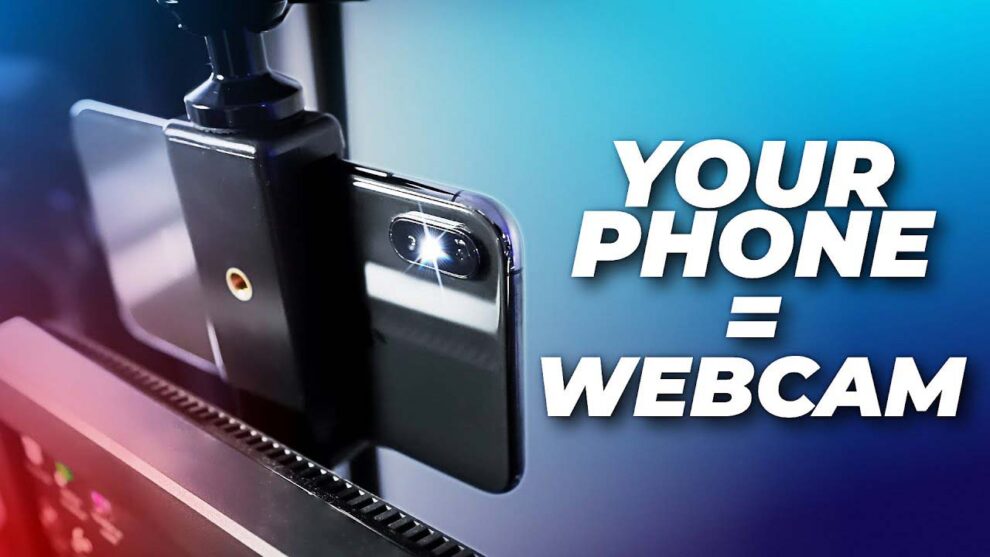Video conferencing and live streaming have become integral modes of communication in the modern digital landscape. However, built-in laptop webcams often deliver disappointing results with grainy, pixelated footage and unflattering angles.
Thankfully, most people carry a powerful video solution right in their pockets – their smartphones! With the right tools and techniques, you can elevate your video presence by harnessing your phone’s superior camera capabilities.
This guide will walk you through everything you need to know to turn your trusty smartphone into a professional-grade webcam for stunning video calls, presentations, vlogs, and live streams.
The Benefits of Using Your Phone as a Webcam
Let’s explore why using your mobile device as a webcam can be a game-changing upgrade from built-in computer cameras:
- Superior Image Quality: Smartphone cameras boast high megapixel counts, powerful image processors, and wide apertures for beautiful background bokeh. This translates to sharper, more true-to-life video.
- Advanced Features: Many smartphone shooters offer auto-focus, HDR, low-light modes, portrait effects, and more – taking your video to the next level.
- Convenience and Portability: As an indispensable everyday carry item, your phone makes webcam capabilities easily accessible and transportable.
- Wider Angles: Phones often have wider fields of view than laptop cameras, fitting more subjects in the frame – perfect for presentations and multi-person calls.
What You Need to Use Your Phone as a Webcam
Turning your smartphone into a high-performing webcam requires just a few key ingredients:
- A smartphone with a high resolution rear camera – iPhone and modern Android devices preferred.
- A webcam/camera app like Epoccam, DroidCam or iVCam to bridge connections between devices.
- Mounting gear – phone tripods, stands and clamps to stabilize your phone’s camera feed.
- USB cable (optional but recommended) – wired connections typically prove more stable than wireless.
Step-by-Step Setup Guide
Ready to get your phone webcam up and running? Follow these simple steps:
- Download and install your preferred webcam app onto both your smartphone and computer.
- Connect phone to computer via USB, WiFi or Bluetooth based on app specifications.
- Open the webcam app on both devices and ensure proper device recognition and connectivity.
- Adjust settings in the app like video resolution, aspect ratio, frame rates and orient your phone appropriately.
- Mount your smartphone on a mini tripod, clip or stand to stabilize camera feed and enable hands-free operation.
Webcam App Showdown: Top Options
With so many webcam apps flooding the market, which ones truly deliver an exceptional experience? Here are top contenders:
1. Epoccam
- Intuitive controls for resolution, aspect ratio, zoom and more
- iOS and Android compatibility
- Wired and wireless connectivity
- Solid performance at an affordable price point
2. iVCam
- Seamless integration with Mac and iOS devices
- Background replacement and effects
- HD video resolutions
- Reliable and user-friendly, but iOS only
3. DroidCamX
- Impressive wireless range and low latency
- Cross-platform compatibility
- Affordable and no watermarks
- Fewer features than rivals but gets basic job done
Pro Tips for Next-Level Webcam Results
Take your smartphone webcam capabilities to the next level with these expert tips:
- Ensure your phone stays charged up to prevent call/stream interruptions from low battery.
- Frame yourself effectively – position phone at flattering face angles and enable portrait modes for stunning bokeh.
- Harness natural light facing a bright window and avoid harsh shadows or excessive backlighting.
- Minimize disruptive background noise by using headphones or enabling Do Not Disturb modes before calls.
- Test and calibrate camera white balance to achieve accurate, natural-looking color and exposure.
Application 1: Elevating Video Calls and Conferencing
From one-on-one catch-ups to large-scale webinars, your smartphone webcam gives you an instant video upgrade over grainy built-in laptop cameras. Enjoy flattering angles and portable conferencing capabilities.
Ideal For:
- Business video calls requiring sharp, professional image quality
- Conducting mobile video calls on-the-go
- Delivering presentations, speeches and lectures over video platforms
- Large conference calls with multiple speakers
Application 2: Live Streaming Like a Pro
Your smartphone also unlocks seamless integration with today’s most popular live streaming platforms. Broadcast crystal clear image quality straight from your mobile device.
Great for:
- Musicians live streaming performances
- Fitness trainers broadcasting workout classes
- Gamers and content creators interacting with audiences
- Remote events and conferences
For smooth operation, ensure your WiFi can handle streaming bandwidth demands or utilize a wired ethernet connection.
Conclusion
Ditch frustrating built-in webcams forever! Your trusty smartphone provides all the tools for professional-looking video communication. Follow this guide to seamlessly connect your mobile video prowess with your computer.
From transformed Zoom presence to engaging live stream productions, unlock a world of crystal clear video content powered by the outstanding camera in your pocket.
















Add Comment